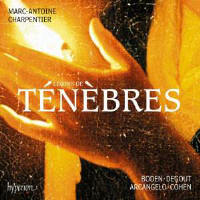Texte paru dans: / Appeared in: |
|
|
Outil de traduction ~ (Très approximatif) |
|
|
Reviewer: J.
F. Weber
The disc is titled Ténèbres (Tenebrae) for the last three works on the program, lamentations for the first night of the Holy Week triduum. Though the liturgical day is Maundy Thursday, Marc-Antoine Charpentier (1643–1704) designates Mercredi saint (Holy Wednesday) for all three, since in his time the night Office was moved up to the previous evening. The group of three settings has been recorded together at least twice. The first was in a fine Louis Devos set of nine lamentations on Erato NUM 75215 (Fanfare 9:6) that was reduced to a single CD by omitting four of the nine (11:5) but restored to a complete set of nine on Erato 4509-96376 (not received for review). The other was in Alpha 185 (36:3). The first and third are sung by baritone Stéphane Degout, the second by tenor Samuel Boden. Neither is familiar to me, though both have been heard around here for several years, even sharing billing in a Rameau opera. Under Jonathan Cohen’s direction, they bring out the wrenching feeling of the laments exquisitely. The players and their instruments support the Baroque idiom elegantly as Cohen leads them. This is my first acquaintance with Cohen, and I regret missing his recent collection of Magnificats by the Bachs.
The works that precede the featured set are not insignificant. The Litany, one of nine in the composer’s output, was first performed by singers in the service of the Duchess of Guise. Like many composers (notably Mozart), he set the Litany without respecting the verse-response form of the text, where each invocation of the Virgin was answered, “pray for us.” It was first recorded by William Christie, then by Jordi Savall (both 13:2); both have been reissued as SACDs. The Magnificat is one of 10 by the composer and only the second of his settings ever to be recorded, by Roland Douatte on an obscure mono LP. It is scored more modestly than the great H 74 and several others. I would have thought H 536 was a first recording, but I found it (by chance) on Alpha 185, along with those three lamentations, though none of the contents of that disc is mentioned in the review cited above. The overture for the consecration of a bishop was one of two such works (the other being H 537) that were intended to precede an offertory motet, Ecce sacerdos magnus. Hitchcock offers no suggestion for any occasion that might have occasioned the composition; Catherine Cessac suggests a date of 1695 with no further information.
I remember the previous generation of Charpentier interpreters, beginning with Louis Martini and later William Christie. This is Cohen’s first Charpentier, though I would have liked to hear his recent Couperin leçons, one of the most frequently recorded sets of the era. This disc calls for further attention to this repertoire, for I see a new star in the offing. | |
|
Support us financially by purchasing this disc from eiher one of these suppliers. Un achat via l'un ou l'autre des fournisseurs proposés contribue à défrayer les coûts d'exploitation de ce site. |
|
|
|
|
|
Cliquez l'un ou l'autre
bouton pour découvrir bien d'autres critiques de CD |
|




